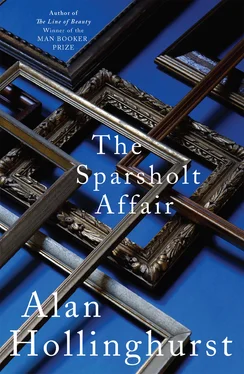Alan Hollinghurst - The Sparsholt Affair
Здесь есть возможность читать онлайн «Alan Hollinghurst - The Sparsholt Affair» весь текст электронной книги совершенно бесплатно (целиком полную версию без сокращений). В некоторых случаях можно слушать аудио, скачать через торрент в формате fb2 и присутствует краткое содержание. Год выпуска: 0101, Издательство: Pan Macmillan, Жанр: Старинная литература, на английском языке. Описание произведения, (предисловие) а так же отзывы посетителей доступны на портале библиотеки ЛибКат.
- Название:The Sparsholt Affair
- Автор:
- Издательство:Pan Macmillan
- Жанр:
- Год:0101
- ISBN:нет данных
- Рейтинг книги:5 / 5. Голосов: 1
-
Избранное:Добавить в избранное
- Отзывы:
-
Ваша оценка:
- 100
- 1
- 2
- 3
- 4
- 5
The Sparsholt Affair: краткое содержание, описание и аннотация
Предлагаем к чтению аннотацию, описание, краткое содержание или предисловие (зависит от того, что написал сам автор книги «The Sparsholt Affair»). Если вы не нашли необходимую информацию о книге — напишите в комментариях, мы постараемся отыскать её.
The Sparsholt Affair — читать онлайн бесплатно полную книгу (весь текст) целиком
Ниже представлен текст книги, разбитый по страницам. Система сохранения места последней прочитанной страницы, позволяет с удобством читать онлайн бесплатно книгу «The Sparsholt Affair», без необходимости каждый раз заново искать на чём Вы остановились. Поставьте закладку, и сможете в любой момент перейти на страницу, на которой закончили чтение.
Интервал:
Закладка:
‘You should have come to the pub with us the other night,’ said David.
‘Well,’ said Jill, ‘I would have done if I could’ – a mercifully ambiguous answer. ‘Where do you like to take her?’
David went quite pink at this. ‘She only got here last week,’ he said. ‘We went to the dance at the Town Hall on Sunday afternoon.’
‘Oh, goodness!’ said Jill, in the tone one might have used before the War of a trip to Paris. ‘I bet that was fun.’
‘They had a pretty good band,’ said David, as if he’d heard a fair few bands in his time. He was warming to her warily. ‘You should get Freddie to take you.’
This seemed to remind her that I was in the room. ‘Oh,’ she said, ‘Freddie doesn’t care for dancing’ – as if the question had ever once come up between us. I didn’t know whether to grin, in the role of comical curmudgeon, or earnestly protest that she had never mentioned the subject. I said, ‘Jill dear, I love dancing, if I’ve had a few drinks.’
‘You can do anything on a few drinks,’ said David.
‘Well, you can get drunk,’ I said, which wasn’t quite a joke. He stood and waited a second, and then smacking his cap in his palm again he said goodbye and crossed the room.
‘Bye . . .’ said Jill, watching the door close.
‘Sorry about that,’ I said, as his heavy tread diminished down the stairs; then a moment later was heard in the quad. ‘He’s only seventeen.’ Jill didn’t quite look at me, she had for the second time the smile of someone under the spell of a recent experience, and reluctant to be brought back to reality. ‘You’re only twenty yourself,’ she said.
This came as a slight surprise even to me. I said, ‘What I mean is, I’m afraid he’s rather a bore.’
Now she looked at me with droll disparagement. ‘He’s gloriously handsome,’ she said – I could see her own words excited her and deepened the feeling they expressed. It was the exalted tone I knew all too well from Evert. ‘Like Clark Gable.’
He really didn’t look like Clark Gable, but I answered pleasantly, ‘Well, I never know. I suppose he must be, from the effect he has on all my friends.’
‘For God’s sake,’ said Jill, with an odd chuckle.
‘In form and moving how express, and admirable . . . maybe,’ I said.
‘Mm?’
I laughed. ‘Jill darling, if you had to talk to him for more than five minutes you’d be yawning your head off.’ I’d never called her darling before and I couldn’t tell if she took it as a tribute or a liberty. She smiled remotely as she put on her coat.
‘Who’s talking about talking?’ she said.
‘Ha-ha!’ This was a mad leap from anything I knew of her, and I saw how in twenty minutes the whole occasion, which had started so sweetly, had slewed out of my control. Now it was her turn to tease me, with her admiration for this teenage star, in whose dull square face she claimed to see beauty, where I saw only the vacuum of culture, the cheery indifference to everything Jill and I, surely, most prized. I said with a forced grin, ‘Well, we’ll go dancing, then. I’m going to take you.’
‘I’ll hold you to that,’ she said, inattentively, as she looked for her hat.
I found it for her and guided her to the door, as if about to start dancing there and then. I slipped a hand round her waist and just before I turned the door handle, as I stooped my head with a questioning smile, she said sharply, ‘Freddie, this kissing must stop.’
Even now I feel the reproving force of those words. She blurted them out, but they had a considered ring, a fatal formula she might have rehearsed many times and which, if so, represented in one stiff phrase a very deep disgust. I stood astonished, and making those immediate convulsive allowances with which one tries to save a person who has been startlingly rude, and almost to reassure them that they haven’t been. I flinched, I blushed, and I believe I giggled, in spite of myself, just for a moment. ‘Freddie,’ she said, ‘you haven’t understood at all.’
9
November 14 had arrived, the day of Victor Dax’s talk to the Club. Before lunch I quickly rewrote my two-page introduction, and then stood to rehearse it, looking out at the quad through rain-streaked windows. As secretary I liked to speak without notes (last week I’d surprised myself with a ten-minute eulogy on Cecil Day Lewis, who’d said drolly that it ought to be published); but Victor was making me anxious. It wasn’t only my mixed feelings about his work (I thought much of Day Lewis was windy and derivative), or the fact of his being Evert’s father. It was to do with the portrait of him Evert had created, inadvertently and piecemeal, in my mind: a man with few friends and little humour, proud of his gift and disdainful of his contemporaries; a man of fanatical habits, who worked each day from eight till four, seen by no one but Herta with her lunch tray; who had, like Brahms or Balzac, a coffee-making device and dosed himself into a mania of production, but then emerged and moved, full of remote benignity, among his family; whose children, even so, lived so much in fear of saying the wrong thing that they barely said anything to him at all. Most worryingly for me, it seemed that praise – a full-page notice in the New York Times , the award of a prize or the Légion d’honneur – made him specially touchy, as if it were too late, too small, or itself somehow belittling. Still, praise him I must, and I was changing my little essay once again in my mind when I saw Evert coming across the quad towards my staircase. His umbrella concealed him from the chest up, but there was no mistaking his walk, the quick small steps. ‘My dear, what a day!’ he said, when he’d come into my room and then gone out again to leave the opened brolly on the landing. (‘Bad luck,’ I heard him say, ‘but still . . .’: the War combined with the Sparsholt affair had made him madly superstitious.)
‘I think things are more or less in order,’ I said.
‘Mm . . . ? Oh, good . . .’ Evert had the look of hollow sleeplessness I’d grown used to, and today he was smiling too, a tense, persistent smile, as if refuting a series of arguments. I’d known from the start that his father’s visit was a challenge for him, which only added to the worry I felt about it myself. A note had come to me from Victor’s secretary announcing his arrival on the 4.30 train, which left us with nearly two hours in which to amuse him before dinner.
‘This weather’s not encouraging, but perhaps your father would like to see the tombs in the Cathedral.’
‘Oh, Christ!’ said Evert.
‘Or I thought some of the Rawlinson manuscripts in Bodley, for instance—’
‘My father’s coming.’
‘Well, yes. You mean you’d forgotten?’
Evert looked at me and shook his head. ‘Oh, Fred,’ he said. ‘That’s not why I’m here, you know.’
‘Well, it’s a good job you are, none the less.’
‘No, no . . .’ He walked around abstrusely for a minute with a hand raised to forbid questions. Then he took an envelope from his breast pocket. ‘I really wanted you to see this,’ he said, but held it and pondered it for a while before passing it over; then he sat down and crossed his legs, and stared ahead as if mentally ready – for triumph or despair, or simply perhaps to reply. In the envelope was a standard white postcard with the College’s embossed address, and beneath it a mere three characters, in careful blue ink:
α & Ω
‘Little alpha,’ I said, ‘but upper-case omega.’
‘Yes,’ said Evert, still gazing ahead, ‘he’s a scientist, not a classicist.’
I winced, stared again at the card, played the part of the slow-witted friend. ‘So you know who sent it,’ I said. I had my ideas, but felt there must be an element of doubt.
Читать дальшеИнтервал:
Закладка:
Похожие книги на «The Sparsholt Affair»
Представляем Вашему вниманию похожие книги на «The Sparsholt Affair» списком для выбора. Мы отобрали схожую по названию и смыслу литературу в надежде предоставить читателям больше вариантов отыскать новые, интересные, ещё непрочитанные произведения.
Обсуждение, отзывы о книге «The Sparsholt Affair» и просто собственные мнения читателей. Оставьте ваши комментарии, напишите, что Вы думаете о произведении, его смысле или главных героях. Укажите что конкретно понравилось, а что нет, и почему Вы так считаете.












